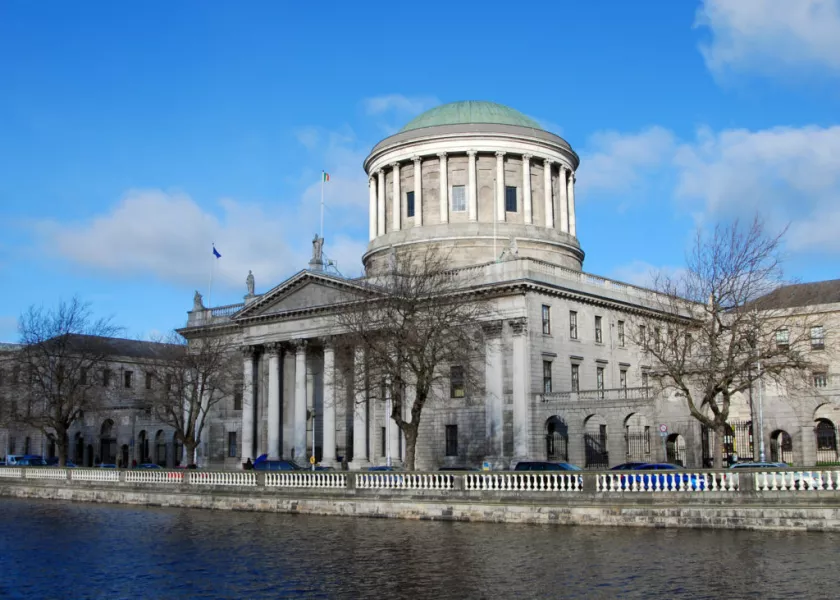
Seán McCárthaigh
A consultant at St Luke’s Hospital in Kilkenny who carried out unauthorised research on five female patients during routine gynaecological procedures has failed in a High Court challenge to prevent his dismissal by the HSE.
Consultant gynaecologist Ray O’Sullivan claimed a decision tby the HSE’s chief executive, Paul Reid, on December 23rd, 2019 to recommend his dismissal was “fatally flawed” for reasons including he was not given the opportunity to comment on an expert’s report into his professional performance.
The hospital began an investigation after nursing staff expressed concern about the risk of infection from a procedure carried out on five patients on September 4th and 5th, 2018 under the direction of Prof O’Sullivan.
A catheter and small pressure pad was placed, without their consent and without seeking approval from the hospital's ethics committee, inside the vagina of five patients who were having a hysteroscopy.
This was done as part of a feasibility study designed to see if certain procedures could be carried out without the use of a speculum.
Injunction
Prof O’Sullivan, who obtained a High Court injunction preventing his dismissal in February 2020, claimed the reaffirmation of the decision to dismiss him on January 31st, 2020, after he had seen the expert’s report, flew in the face of its findings. He also claimed Mr Reid was not medically qualified.
He argued he should have been reinstated immediately and the recommendation to dismiss him was irrational and ought to be struck out.
Prof O’Sullivan claimed the entire investigatory process was tainted by bias as he had been an outspoken critic of management at St Luke’s Hospital and the HSE over a long period of time.
He claimed a decision on August 6th, 2019 to place him on administrative leave was irrational as it was taken ten months after he had overseen the unauthorised procedures, while there had been no complaint or concern about his suitability to treat patients during that period.
Mr Reid placed the consultant on leave after the chief executive of the Ireland East hospital group, Mary Day, notified him on July 1st, 2019 she had concerns he could pose an immediate and serious risk to the health and safety of patients and hospital staff.
Fair procedure
Opposing the application, the HSE denied any bias or absence of fair procedures in the inquiry into Prof O’Sullivan’s actions.
It said Prof O’Sullivan had not originally seen the medical expert’s report because of problems with his solicitor’s computer, but it was resent and he had an opportunity to comment on it before the decision to dismiss him was taken.
The HSE said Mr Reid was not bound to follow the opinion given in the expert’s report and it was only necessary for Mr Reid to set out clearly the grounds why he did not follow it.
While acknowledging Prof O’Sullivan had made an error of judgement, the expert report by a consultant obstetrician and gynaecologist, Michael O’Hare, was supportive of his actions and said the procedure was a well-intentioned “additional observational procedure” by a long established and highly trained consultant.
Dr O’Hare also said he did not believe Prof O’Sullivan posed any immediate or serious risk.
The court heard the five patients, who were tested for infection including HIV, were greatly shocked and upset when St Luke’s informed them about what happened at open disclosure meetings.
Wrong to patients
Asked to review a report on the matter by St Luke’s, the clinical director of the National Women and Infants Health Programme, Peter McKenna, said the significant issue was not harm, but wrong to the patients.
Dr McKenna said Prof O’Sullivan did not appear to have shown either insight or remorse for his actions.
He said he had significant reservations about Prof O’Sullivan’s continuing involvement in clinical practice given the psychological harm suffered by the patients, the breakdown of trust and his serious lack of insight.
At a meeting with Mr Reid on September 13th, 2019, Prof O’Sullivan admitted he had made an error of judgement in not having obtained the consent of the patients and the hospital’s ethics committee.
Below standards
In his judgment, Mr Justice Anthony Barr, said decision makers are always free to depart from advice given as long as they provide clear and cogent reasons why.
The judge said it was clear Mr Reid had not ignored Dr O’Hare’s report but did not agree with the consultant’s findings that Prof O’Sullivan’s conduct had fallen below, but not seriously below, the standard expected among doctors.
Dismissing the consultant’s case, Mr Justice Barr said the court was satisfied the HSE chief executive had given great consideration to all relevant matters in reaching his conclusion.
The judge could not find that Mr Reid’s decision was “unjust, irrational or disproportionate” and noted the CEO had a considerable body of evidence which supported the reason to dismiss the consultant.
Mr Justice Barr also noted that Prof O’Sullivan still did not admit there was any misconduct on his part.
He also lifted a stay on further investigation into the matter imposed by the High Court 14 months ago.













